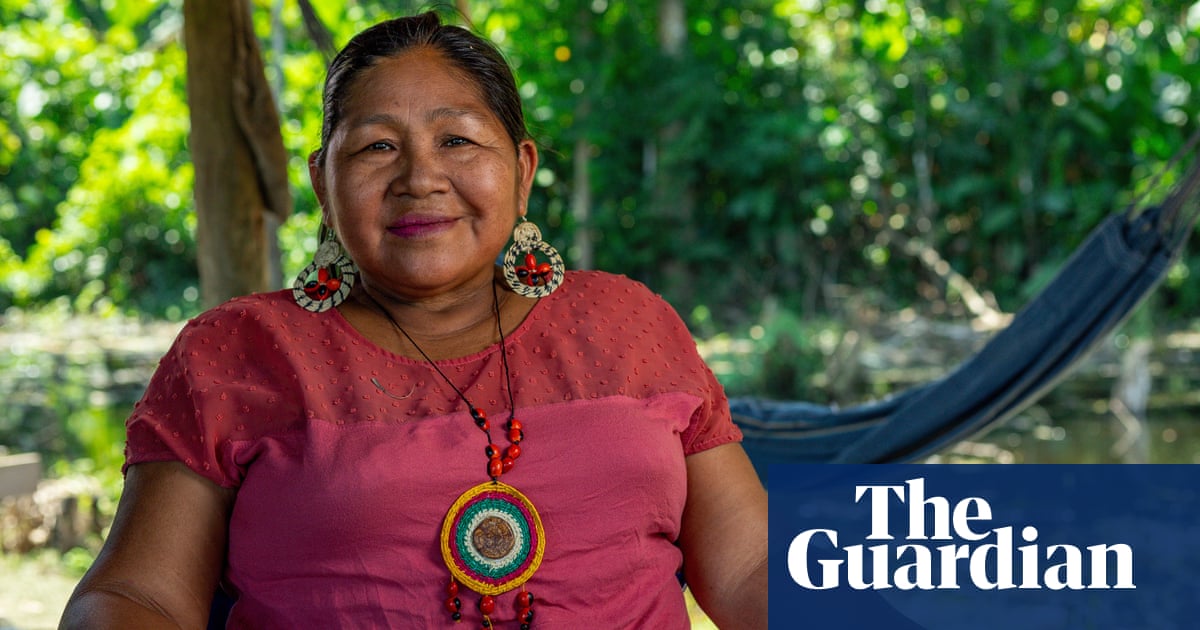An Indigenous campaigner and women’s leader from the Peruvian Amazon has been awarded the prestigious Goldmanprize for environmental activists,after leading a successful legal campaign that led to the river where her people, the Kukama, live being granted legal personhood.
Mari Luz Canaquiri Murayari, 57, from the village of Shapajila on the Marañon River, led the Huaynakana Kamatahuara Kana (HKK) women’s association, supported by lawyers from Peru’s Legal Defence Institute, in a campaign to protect the river. After three years, judges in Loreto, Peru’s largest Amazon region, ruled in March 2024 that the Marañon had the right to be free-flowing and free of contamination, respecting anIndigenous worldview that regards a river as a living entity.
It was a landmark ruling inPeru. The court in Iquitos, Loreto’s capital city, found the Peruvian government had violated the river’s inherent rights, and ordered it to take immediate action to prevent future oil spills into the waterway. The court also ruled that the government must mandate the creation of a protection plan for the entire river basin and recognise the Kukama community as its stewards. The government appealed against the decision, but the court upheld the ruling in October 2024.
“She is the ‘mother of rivers’, the Marañon is born in the Andes and flows downstream to become the Amazon River,” Canaquiri said. The Kukama believe the river is sacred and that their ancestors’ spirits reside in its bed. for four decades, however, the Kukama have endured scores of oil spills which destroy fish stocks, damage the ecosystem and contaminate the water with heavy metals.
The Peruvian state oil company Petroperú began building the theNorthern Peruvian pipelinein 1970s, and the region around the Marañon River has accounted for 40% of the county’s oil production since 2014 – with devastating effects. There have been more than 60 oil spills along the river since 1997, some of them catastrophic.
“My grandparents taught me that there is a giant boa that lives in the river,Puragua, the ‘mother of the river’,”said Canaquiri. The spirit represents the health of the river and its personhood, according to the Kukama’s cosmovision.
In practical terms, the Kukama depend on the river for transport, agriculture, water and fish, which is their main protein source. As a result of the the oil drilling, however, they have become highly vulnerable to water contamination.
Local people have suffered from fevers, diarrhoea, skin rashes and miscarriages after oil spills, and elevated levels of lead, mercury, arsenic and cadmium were found in the blood of river community members in a2021 study.
Canaquiri, a mother of four with six grandchildren, remembers a blissful childhood with abundant fish and animals before the oil drilling began. “There was plenty of food. We shared everything, worked on each other’s farms and celebrated the festivals together,” she said.
Despite the ruling, the river is not out of danger and Canaquiri and the HKK are asking the Peruvian government to implement the court’s ruling. The fight continues.
Sign up toDown to Earth
The planet's most important stories. Get all the week's environment news - the good, the bad and the essential
after newsletter promotion
Peru’s congress passed ananti-NGO lawlast month, which the country’s president, Dina Boluarte, approved last week. The law prevents civil society organisations from taking legal action or even giving legal counsel in cases against the state over human rights abuses.
Canaquiri says the law could cripple their legal battle. “It is worrying because it means lawyers cannot take our cases to enforce our fundamental rights,” she said.
“It is not just for us, it is also for the country and the world. Who can live without breathing? If it wasn’t for the Amazon, the forest, the rivers, we wouldn’t have clean air to breathe. How would we get food to eat every day, our fruits, our vegetables, our animals, our fish?”
She says she and the HKK are motivated by the future of their children and grandchildren,: “The government needs to understand that it should not kill nature but protect it. Otherwise, what hope will our children, the next generation, have?
